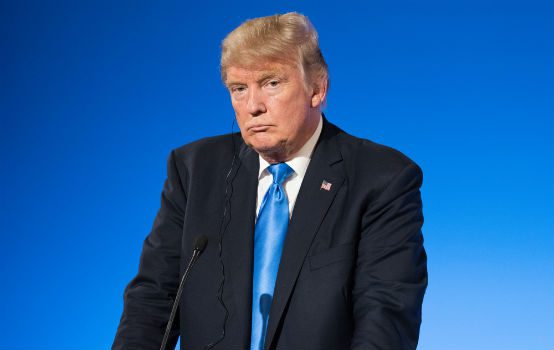The GOP’s Real Conflict: Lust for Power Versus Fundamental Truth

Both of America’s political party establishments have gone adrift, though in very different ways. As Ross Douthat observed last year, the GOP “behaves like it’s in the political wilderness, an election-winning machine that has no idea what to do with power.”
This is manifestly not the case for Democrats.
When Bruce Miller, the creator of the television adaptation of The Handmaid’s Tale, ended his Golden Globe speech with a call to prevent his show’s dystopian future from coming to fruition, liberals knew exactly what he meant. Their ultimate purpose is to demonize and persecute those who are, by dint of binary logic, intent on creating the type of world depicted in Miller’s series.
Inherent in that purpose is the presumption that the authoritarianism of the right is fundamentally more cruel and pernicious than traditional socialism or our rules-based globalist system, which are well-meaning and have a cosmopolitan flavor. Though its statism suffocates individual freedom, the left readily excuses itself on the basis that its bullying is supposedly directed towards a common cause for humanity as a whole.
The GOP can’t win this Manichean battle, principally because, in its heart of hearts, it identifies with Charles Péguy’s lament that “everything begins in la mystique and ends in la politique.” The radical consequences of its skepticism often leaves its followers floundering in no-man’s land, attempting to reconcile life’s innate uncertainties with the value of bureaucratic authority, whether secular or religious.
To know the state is limited in what it can achieve with respect to justice, equality, and other shared ideals, is to accept that, in the end, all ideology and power, while necessary, is nonetheless insufficient. To believe social renewal and genuine community are about everyday people connecting in ways that can’t be forced or engineered is also to believe real change involves living the libertarian implications of this spiritual ethos. Coveting power in order to prevent Democrats from exercising what you claim is ultimately impotent (and thus arbitrary and divisive) not only legitimizes an all-consuming, zero-sum politics, it undermines the moral authority required to put liberal hubris in its place.
Despite decades of rhetoric championing self-government and personal conscience, however, the Republican leadership has not encouraged voters to seek their rewards outside the halls of federal power. Rather, as described by P. J. O’Rourke in Don’t Vote! It Just Encourages the Bastards, it has embraced self-deception:
Liberalism has been running wild in the nation since the Great Depression, and at the end of the Carter administration we had it cornered in one of its dreadful housing projects or smelly public parks or some such place, and we had the Taser gun in our hand, pointed at the beast’s swollen gut, and didn’t pull the trigger.
We didn’t kill liberalism because that would have meant killing power. And we wanted the power ourselves.
Justified disappointment with Republican cowardice is not something that can be expressed in strictly rational terms. By necessity, it has a metaphysical element consistent with a yearning for that which lies beyond politics. And according to Steve Bannon, as documented in Fire and Fury, Donald J. Trump has the uncanny ability to fathom this unfathomable sentiment:
“Does he get it?” asked Ailes suddenly, looking intently at Bannon. Did Trump get where history had put him? Bannon took a sip of water. “He gets it,” he said, after hesitating for perhaps a beat too long. “Or he gets what he gets.”
Alas, as Bannon discovered, converting this into a concrete political agenda is problematic. And for good reason: the zeitgeist does not lend itself to ideology.
Commenting on Bannon’s downfall, Jonah Goldberg noted that one of the key sources of power and influence is “significant ownership of an Idea Whose Time Has Come and the ability to sell it.” But what if that Idea is grounded in the countercultural notion that all animating ideas are ultimately lacking and that power is inescapably self-serving? What if the only actual solution on offer is a localized one based on the good will of people who understand and accept the bounds of democracy?
Events like the Golden Globes represent a subtle challenge for a disenchanted and dysfunctional Republican establishment. So you think the vilification is unfair and you don’t want billionaire celebrities in the White House? Okay, then finally step up and do as Oprah suggests: “speak your truth.”
Democrats regularly affirm their galvanizing truth, which of course involves an overreaching hegemony that has no regard for reality. Polarizing power, more laws, and welfare programs can’t realize the American Dream, since la politique is always—thankfully—overwhelmed by la mystique. Human agency and judgment are unavoidable.
It’s time for Republicans to articulate their truth, with an unconditional commitment that transcends partisan politics. O’Rourke has already made a key admission: “We never tried, in words or deeds, to convey to the electorate the universal and organic nature of freedom.”
And Péguy can provide the clincher: “The revolution is moral, or not at all.”
Mark Christensen is an economist and political commentator who has been published in leading Australian media, along with The Hedgehog Review and Front Porch Republic in the United States. He is presently writing a book on the plight of Western civilization.
Comments